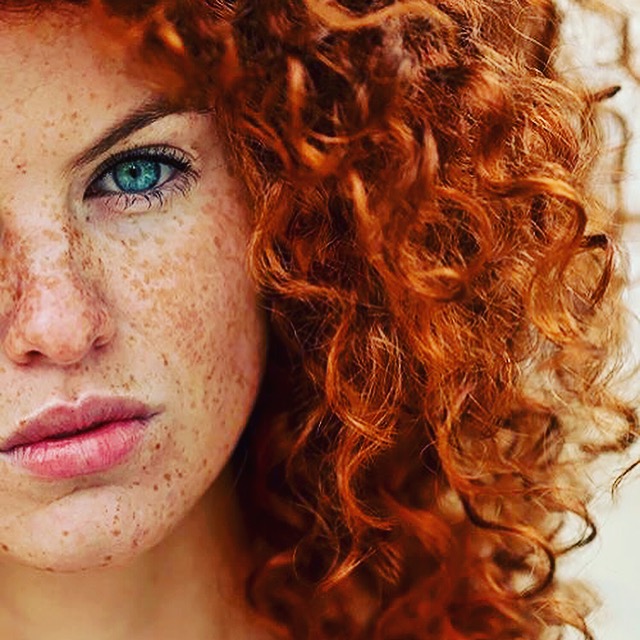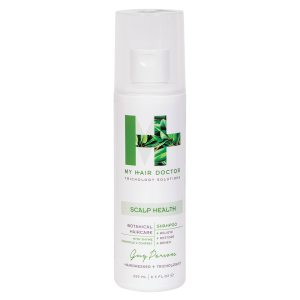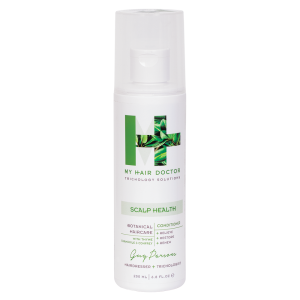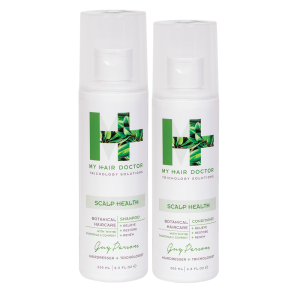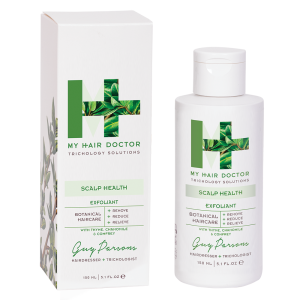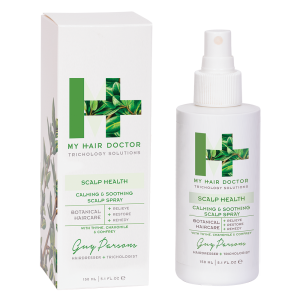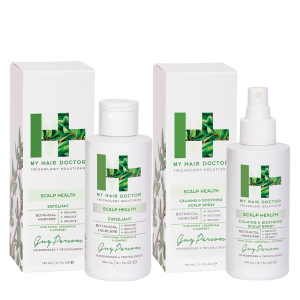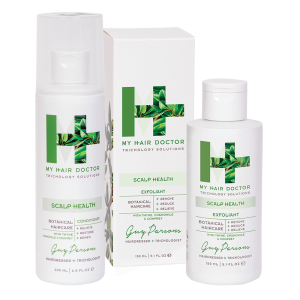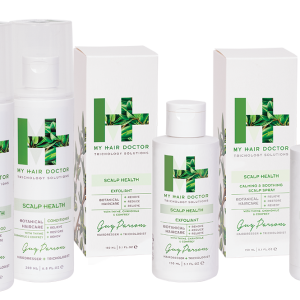Scalp Health, Hair Science
DANDRUFF OVERVIEW
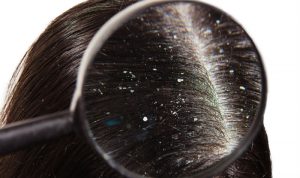 Dandruff is a common skin condition that causes dry white or grey flakes of dead skin to appear in the scalp or hair.
Dandruff is a common skin condition that causes dry white or grey flakes of dead skin to appear in the scalp or hair.
The flakes are often noticeable if they fall from your scalp on to your shoulders. Your scalp may also feel dry and itchy. It’s not contagious and doesn’t usually pose a threat to health, but can be unpleasant and embarrassing. Dandruff can range from mild to severe.
What causes dandruff?
The body continually sheds dead skin cells as new cells are formed. In most cases, this is a gradual process that goes unnoticed. However, this process can speed up, producing excessive amountsof dead skin cells, which causes dandruff. It’s not always clear why this happens, but possible causes include seborrheic dermatitis (see below), a common skin condition that causes oily skin.
While not directly responsible, certain things can make your dandruff worse, such as:
- overuse of hair products
- emotional stress
- washing your hair too much or too little
Most people have had or will experience some degree of dandruff during their life. If you have a flaky/itchy scalp, don’t be embarrassed: you are not alone and there are many effective products available to treat it. ‘Dandruff’ describes scalp flaking – however, there are various degrees of severity ranging from common dandruff i.e. loose or tight flakes, to more severe seborrheic (sebum related) dermatitis.
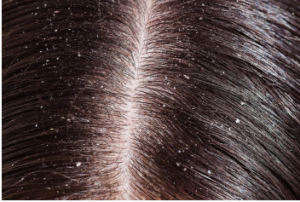 The most common type of dandruff is ‘pityriasis capitis simplex’ or ‘pityriasis steatoides’. It usually comes and goes and you may find it flares up under stress. Mild to moderate dandruff is easily treated with over-the-counter shampoos, toners and exfoliators. However, a severe build-up of flakes may need to be treated with stronger prescription products, as it can cause severe discomfort and also eventually may lead to some hair loss.
The most common type of dandruff is ‘pityriasis capitis simplex’ or ‘pityriasis steatoides’. It usually comes and goes and you may find it flares up under stress. Mild to moderate dandruff is easily treated with over-the-counter shampoos, toners and exfoliators. However, a severe build-up of flakes may need to be treated with stronger prescription products, as it can cause severe discomfort and also eventually may lead to some hair loss.
Make an appointment to see a trichologist if you are concerned. Dandruff is a non-inflammatory scalp condition. It should not cause redness, unless you are scratching your scalp repeatedly. If your scalp is red, you may have a different scalp condition and should see a trichologist.
SYMPTOMS OF COMMON MILD TO MODERATE DANDRUFF
Flaking of the scalp; an itchy or irritated scalp; the appearance of white flakes on your shoulders; flakes on the scalp and/or some throughout your
hair.
SYMPTOMS OF SEVERE DANDRUFF OR SEBORRHOEIC DERMATITIS
Patchy yellowish flakes on your scalp with redness and soreness; many and obvious flakes throughout the length of your hair; tight, adherent flakes. It can also affect eyebrows, and may cause redness around the nose.
SIMPLE SCIENCE BEHIND DANDRUFF
SKIN SHEDDING
Your skin is shed and replaced constantly, including the skin on your scalp. Dead skin is washed away when you bathe and rubbed off by your clothes. On your scalp it is removed when you shampoo or brush your hair or both, so you usually don’t notice it. Scalp skin shedding becomes noticeable when there is an imbalance of bacteria on your scalp, or if you aren’t washing your hair frequently enough. Our skin is covered in millions of micro-organisms – otherwise known as bacteria, germs or ‘skin flora’. Your skin secretions, sweat and sebum (oil produced under the scalp), usually form a protective layer that prevents bacteria from multiplying on your scalp. However, factors such as illness, stress, diet and hormonal fluctuations can disrupt this barrier, allow bacteria to multiply and this can lead to excessive shedding of your scalp skin, or ‘dandruff flakes’.
THE CAUSES OF DANDRUFF
- Poor hygiene and infrequent shampooing
- Diet rich in fatty, salty or sugary foods
- Eating dairy products if you are already prone to the condition
- Hormonal changes and fluctuations
- Psychological or physical stress
- Cold or dry weather and climate
- Pre-menstrual syndrome
TREATMENT – PRODUCTS
A common misconception is that dandruff is caused by a ‘dry scalp’. However, dandruff can be oily. Do not put or rub oil into your scalp as this will only make the flakes oilier and stickier. Use a flaky/itchy scalp shampoo and flaky/itchy scalp tone or exfoliator daily until your dandruff has cleared, and then alternate every other day with your regular shampoo for a couple of weeks after. An exfoliating scalp mask should also be applied once a week to help clear flaking and itching, if you have moderate to severe dandruff.
Apply before shampooing in 1-inch partings and massage into your scalp. Leave for 10-15 minutes and wash out with a flaky/itchy scalp shampoo, and then use the correct conditioner for your hair texture.
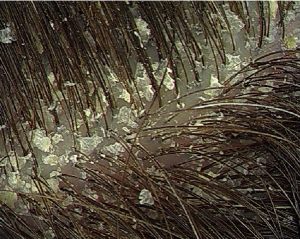 DIET AND LIFESTYLE
DIET AND LIFESTYLE
If you have a mild to moderate flaky and/or itchy scalp, it’s a good idea to look at your diet and lifestyle. The condition of your scalp can often be improved by making simple changes. Try to restrict dairy products for a few weeks as dairy can exacerbate flaking and eczema. Also, cut back on foods rich in salt, ‘bad fats’ and sugar. Taking time out for yoga, meditation, general relaxation and fitness can help manage stress levels and can sometimes reduce the severity and frequency of dandruff.
WHEN TO SEE A TRICHOLOGIST
If you have severe redness or discomfort on your scalp, especially when accompanied by hair loss, you should make an appointment to see a trichologist as soon as possible. Using some or all of the above forms of treatment will clear up most forms of dandruff. If not, you may have one of the following conditions that can also cause scalp flaking and should see a specialist. Other possible conditions that can cause scalp flaking include:
Other possible conditions that can cause scalp flaking include:
- Seborrheic Dermatitis
- Psoriasis
- Pityriasis Amientacea
- Neurodermatitis
- Lichen Simplex
- Folliculitis & Rosacea
- Cicatrical Scarring Alopecia
Scalp Health Active Botanicals


THYME
Thyme Oil has an anti-bacterial effect due to its high content of phenol (antiseptic) and is used for this benefit in scalp care preparations.


CHAMOMILE
(Bisabolol) A clinically tested active; Bisabolol protects and heals the skin from the effects of daily stress. It is a naturally occurring active ingredient found in chamomile that accelerates the healing process.
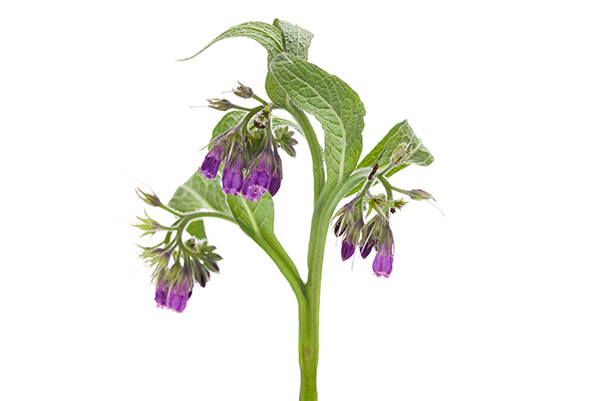

ALLANTOIN
(Comfrey) A clinically tested soothing, softening and protective active as found in the comfrey plant. It improves the skin's moisture retention providing a smoothing effect. It exfoliates dry and damaged cells increasing softness and a radiant appearance. It helps with the prevention of scalp irritation and supports the natural regeneration of the skin/ scalp.
